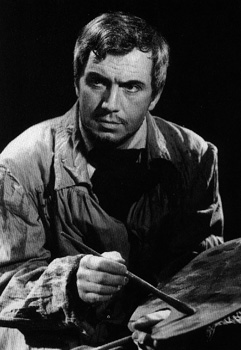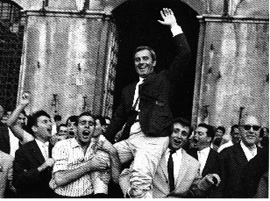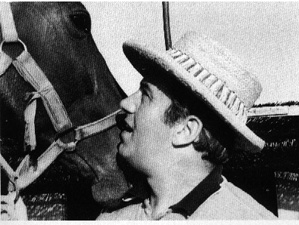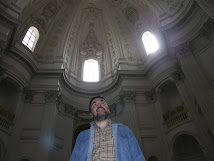Ettore Bastianini nacque il 24 settembre 1922 a Siena nella contrada della Pantera, e morì a Sirmione sul lago di Garda il 25 gennaio 1967. Era figlio di padre ignoto e sua madre era tutto quello che lui aveva di più importante al mondo. La sua voce era molto bella naturalmente e iniziò subito dopo la guerra una breve carriera  come basso che però stentava a decollare, ma poi, convinto dal suo maestro Luciano Bettarini, studiò per sei mesi da baritono nel 1951 a 29 anni. Era però molto povero e non poteva permettersi le lezioni, ma il suo maestro gli fece le lezioni a credito convinto che lo avrebbe ripagato, come infatti fece in seguito quando divenna ricco.
come basso che però stentava a decollare, ma poi, convinto dal suo maestro Luciano Bettarini, studiò per sei mesi da baritono nel 1951 a 29 anni. Era però molto povero e non poteva permettersi le lezioni, ma il suo maestro gli fece le lezioni a credito convinto che lo avrebbe ripagato, come infatti fece in seguito quando divenna ricco.
Era talmente povero che si doveva fare la barba per una settimana con la stessa lametta! Ci volle poco però perchè arrivasse il debutto come baritono nella sua Siena nel gennaio del 1952 e poi nel dicembre dello stesso anno al Comunale di Firenze nella "Dama di picche" di Ciaikovskij. Nel 1953 esordì poi a Torino nello "Chenier" e poi quello stesso dicembre era già al Metropolitan di New York in "Traviata" dove ricevette una vera ovazione alla fine della sua aria!!! La sua voce era così bella che venne paragonata al bronzo e al velluto poichè era potente e solida ma morbida allo stesso tempo.
Si avviò quindi ad una folgorante carriera che andò di trionfo in trionfo e nel 1955 era alla Scala di Milano nella leggendaria produzione di Visconti di "Traviata" con Maria Callas e Giulini sul podio. Cantò poi, nella sua pur breve carriera di poco più di 10 anni, in ben 20 opere diverse alla Scala come baritono principale. Diventò quindi il baritono principale dei principali teatri del mondo: la Scala, Vienna e New York oltre a frequenti apparizioni a Covent Garden a Londra, Salisburgo, Chicago.
Poi proprio quando, nel 1962, sembrava che avesse trovato in una giovane ragazza chiamata Manuela la donna della sua vita, la terribile diagnosi fattagli a Chicago: cancro alla gola! Non disse niente a nessuno e si tenne per sè il terribile segreto, considerato anche che la sua cara madre era appena morta ed era solo. Disse alla sua fidanzata che non potevano continuare insieme senza dirle il perchè. Continuò la sua carriera ma doveva sottoporsi alle terribili radiazioni poichè aveva rinunciato ad una operazione chirurgica che se poteva forse farlo vivere fino a tarda età, gli avrebbe d'altra  parte tolto la sua principale ragione di vita: l'espressione artistica del canto lirico.
parte tolto la sua principale ragione di vita: l'espressione artistica del canto lirico.
Naturalmente la sua voce non era più quella di prima ma nessuno sapeva perchè e alla fine accadde l'inevitabile: il 10 aprile 1962 venne fischiato alla Scala in Rigoletto dove la sua voce cominciò a non rispondere più ai comandi. Seguì un penoso declino che venne solo interrotto dalla gioia di veder vincere la sua contrada della Pantera nel Palio di Siena proprio nell'anno in cui lui ne era diventato il Presidente. Nelle foto in questa pagina potete vedere Ettore portato in trionfo dai suoi contradaioli e con il cavallo che vinse il Palio e che lui in seguito comprò e ribattezzò, naturalmente, "Ettore".
Poi tornò il dolore e i grandi teatri, uno dopo l'altro chiusero il contratto con lui e il destino volle che l'ultima scena che lui cantò nel 1965 nei tre grandi teatri di New York, Milano e Vienna sia stata proprio quella della morte del Marchese di Posa nel Don Carlo di Verdi, il nobilissimo ruolo che lui aveva sempre cantato così bene...
Il pubblico, la critica, i suoi stessi colleghi e tutto il mondo della lirica si interrogarono su questo misterioso calo di un cantante di poco più di 40 anni e fu con stupore e dolore che si apprese la notizia della sua malattia quando ormai era in punto di morte. Morì a Sirmione il 25 gennaio 1967 a 44 anni e fu solo per una pura coincidenza che la ragazza che lui aveva amato, Manuela, che aveva voluto lasciare 5 anni prima, che non aveva più visto e che si era anche sposata, si trovò lì sola con lui a raccogliere il suo ultimo respiro. Due giorni dopo ricevette a Siena dei funerali a cui fu presente tutta la città. Ricevette gli onori di Capitano in carica della contrada della Pantera e fu un cerimoniale di funerale di stato. Quando il funerale passò davanti ad una delle aperture su Piazza del Campo, la bara venne girata verso la Torre del Mangia per un ultimo saluto mentre la campana del Palazzo Comunale suonava a morto.
stupore e dolore che si apprese la notizia della sua malattia quando ormai era in punto di morte. Morì a Sirmione il 25 gennaio 1967 a 44 anni e fu solo per una pura coincidenza che la ragazza che lui aveva amato, Manuela, che aveva voluto lasciare 5 anni prima, che non aveva più visto e che si era anche sposata, si trovò lì sola con lui a raccogliere il suo ultimo respiro. Due giorni dopo ricevette a Siena dei funerali a cui fu presente tutta la città. Ricevette gli onori di Capitano in carica della contrada della Pantera e fu un cerimoniale di funerale di stato. Quando il funerale passò davanti ad una delle aperture su Piazza del Campo, la bara venne girata verso la Torre del Mangia per un ultimo saluto mentre la campana del Palazzo Comunale suonava a morto.
-----------------------------------------------------------------------------------------------------------------
Ettore Bastianini was born on the 24th of September 1922 in Siena in the district ("contrada") called Pantera (the Panther), and he died in Sirmione on Lake Garda on the 25th of January 1967. He was son of an unknown father and his mother was all he had of any importance in this world. He voice was naturally very beautiful and he started right after world war two a short carrer as a bass. He wasn't going anywhere really, but one day he was convinced by his teacher Maestro Luciano Bettarini to try to study for six months as a baritone. It was 1951 and he was 29. He was very poor though, and he couldn't afford to pay for the lessons, but his teacher said to him that he would have paid him later when he would have been rich and famous, and that's exactly what happened!
He was so poor that he had to shave himself with the same razor for a whole week, because he couldn't even afford to buy new razors! It didn't take long to get to his debut as a baritone in his Siena on January 1952 and then, that same year, on December at the Teatro Comunale in Florence in "The queen of spades" by Tciaikovskij. In 1953 he sang in Turin in "Andrea Chenier" and then, on December of that same year, he was already at the Metropolitan Theatre of New York in "Traviata" where he received an ovation after his aria!!! His voice was so beautiful that was compared to bronze and velvet because it was powerful but soft at the same time.
He was on his way then to a great carrer, going from triumph to triumph, and in 1955 he was at La Scala in Milan in the legendary Visconti production of "Traviata" with Maria Callas and Giulini as conductor. He would sing then, in his short but very intense carrer (just over 10 years), for the Teatro alla Scala in 20 different operas as the principal baritone. He became then the principal baritone of the most important theatres of the world: La Scala, Vienna Staatsoper and New York apart from frequent performances in all the others including London, Salzburg, Chicago...
Then, just when in 1962, he thought he had found finally the woman of his life, a young girl called Manuela, the terrible condamn to death in Chicago: cancer in the throath! He never said anything to anyone and he kept for himself the horrible secret. His dear mother had died in that same period and he was alone. He said to his girlfriend that he couldn't go on with her anymore without telling her why. He kept going with his carrer but he had to undergo the terrible radiations because he had refused to have an operation that, if it might have made him live until old age, he would have taken away, on the other hand, his main reason to live: the artistic expression of singing.
Of course his voice wasn't the same anymore but nobody knew why, and eventually the inevitable happened: he got booed at La Scala in "Rigoletto" as his voice wasn't responding anymore to the orders of his will. A sad decline followed and the only happy moment was the victory of his district "The Panther" in the horse race of Siena "Il Palio" while he was President and Captain. In the pictures in this page you can see Ettore in triumph after the victory and with the winning horse. He bought the horse afterwards and he called him "Ettore", of course.Then sorrow and pain came back and the great theatres one after another finished the contracts with him. Destiny wanted that the last scene he sang in 1965 in the three greatest theatres of Vienna, Milan and New York was the death scene of Marquis of Posa in "Don Carlo" by Verdi, the noble role he had sung so well in the past...
Public, critics, his colleagues and everybody in the opera world wondered about this misterious decline of a singer just over 40 years old who had been so good before, and it was with surprise and sorrow that the news of his illness was received, when he was already about to die. He died in Sirmione on the 25th of January 1967 at only 44 and it was for pure coincidence that the girl he had loved, Manuela, the one he had wanted to leave 5 years before, the one he had never seen anymore since, the one who even had married in the meantime, was the only one there with him when he gave his last breath. Two days later all the town of Siena was there for his funeral. He received the honours of Captain of the "Contrada della Pantera" and it was the procedure of a funeral of State. When the funeral passed close to one of the openings on Piazza del Campo, the coffin was turned toward the Tower of Mangia for a last goodbye as the bell of the Palazzo Comunale stroked death tolls.
The memory of his Art has never died though. It goes on alive all over the world among the REAL music lovers, the people who study it , who sing it, who listen to it, who goes to the theatre hoping desperately to find something decent among the too many CARDBOARD VOICES around, especially male singers. It is really SAD that the wonderful art of opera singing is drowning into oblivion and one of the reasons is definetely the fact that there are too many singers with NO BALLS! Ettore Bastianini will always live in our memory.

